Or: How I Learned to Stop Watching and Start Drowning
I stumbled upon The Merciless the way one stumbles upon old love letters—accidentally, through an algorithm that knew me better than I knew myself.
After watching Good News on Netflix, the platform served me this eight-year-old film, and just like that, I completed my accidental Byun Sung-hyun trilogy: Kill Boksoon, Good News, and now this.
What Director Byun actually wanted to make, he said, was simple: a melodrama dressed in noir clothing.
A love story between two men drawn to each other despite being—or perhaps because of being—fundamentally different. Though one must ask:
Are they really that different? Or is that difference merely the costume they wear, like the noir itself?
On Auteurs Who Don’t Apologize
What I love most about Byun Sung-hyun is this: he doesn’t give a damn what critics think. He tells the stories he wants to tell—sometimes quirky, sometimes audaciously bizarre—and he does it with the kind of style that makes you forget to blink. He’s a true artist who knows how to craft allegories, how to make metaphors sing.
If you loved 🔗 Hong Kyung in Good News, you need to understand where Byun came from. And it starts here. With The Merciless. With two men in a prison.
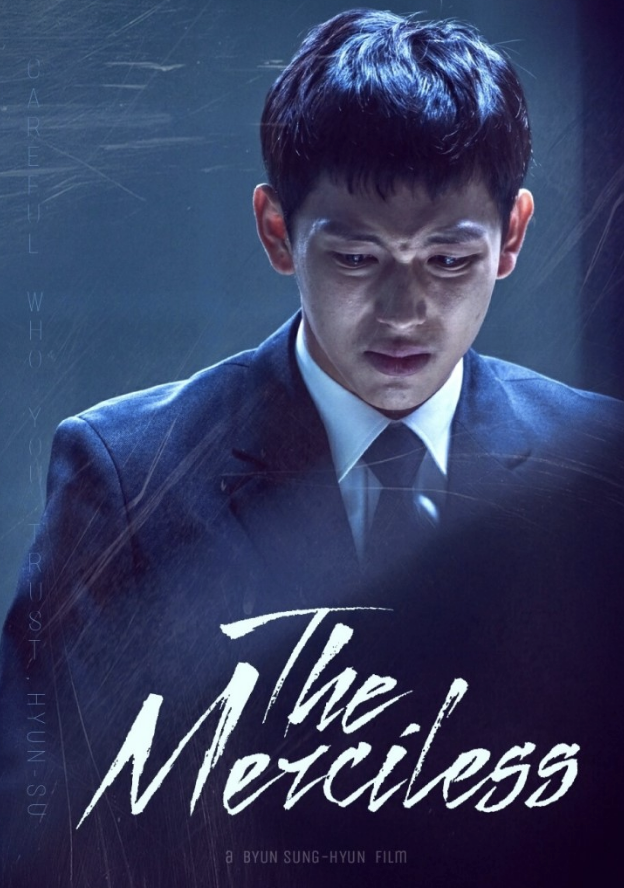
The bare bones are simple enough.
Han Jae-ho is the second-in-command in a drug trafficking organisation. Jo Hyun-soo is an undercover cop infiltrating said organisation. They meet in prison. They’re drawn to each other. They build something that looks like trust. And then everything falls apart, as it must, as it was always going to.
But here’s what makes this film different, what makes it linger in your bones long after the credits roll: This isn’t about betrayal. It’s about love.
The Ball Always Knows Where to Go
There’s this scene that keeps returning, like a refrain in a song you can’t get out of your head. Jae-ho bouncing a ball. Wall. Floor. Hand. Wall. Floor. Hand.
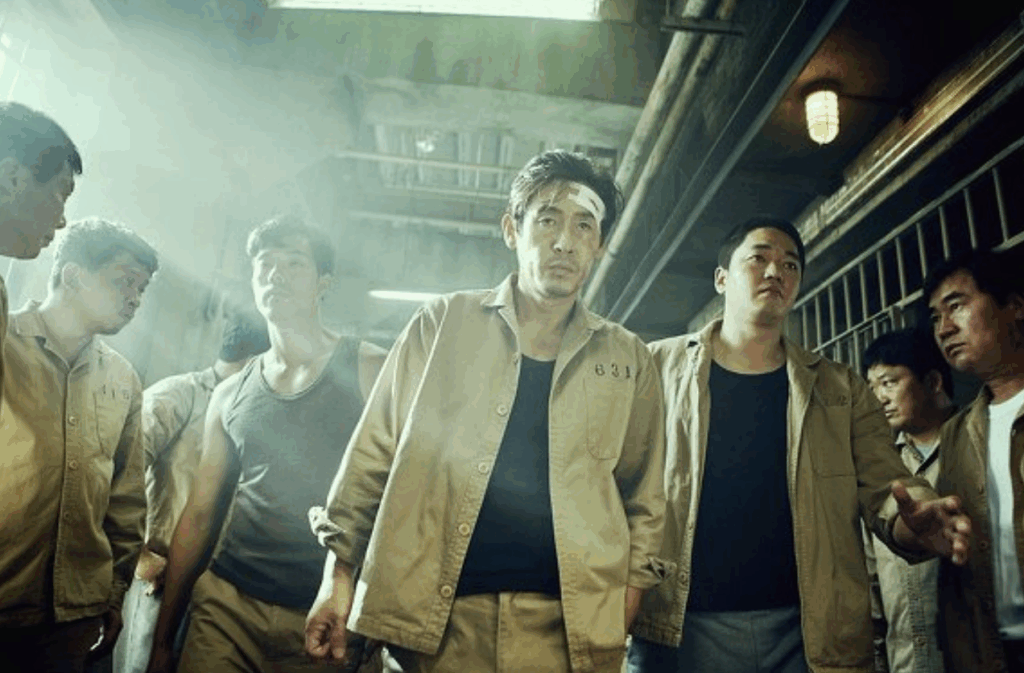
Watch his eyes. He’s tracking every single movement with the precision of a man who’s spent his entire life calculating trajectories. He knows exactly where the ball will go. He controls it. This is who Han Jae-ho is—someone who predicts, calculates, and controls.
Remember when he says:
“Don’t start a war now. Everyone will just follow the money. Stay low. Wait for the perfect timing”?
He waits. He plans. And at the perfect moment, he strikes. That’s how he takes down Chairman Go. That’s how he manipulates Hyun-soo into his orbit—step by calculated step, like a chess master playing five moves ahead.
The ball never surprises him until it does.
Love at First Sight
Why does Jae-ho fall for Hyun-soo? Sul Kyung-gu asked Director Byun this exact question.
“Why does Jae-ho like Hyun-soo?”
The director’s answer was beautifully simple: “Love at first sight.”
Sul Kyung-gu, being the professional he is, asked how to act that out. Byun told him to watch Todd Haynes’ Carol—specifically, the way Cate Blanchett looks at Rooney Mara. That gaze. That longing. That hunger. No reason. No logic. Just love.
But let me unpack what draws them to each other, because even love at first sight has its archaeology.
From Jae-ho’s perspective, Hyun-soo possesses something Jae-ho has likely never encountered in his world of calculated betrayals: unconditional love for his mother. She’s his priority. He’d die for her. That kind of blind, pure familial devotion?
Jae-ho isn’t just fascinated by it—he’s captivated by the purity of someone capable of that kind of love. In a world where everything is transactional, where loyalty is bought and sold like drugs, Hyun-soo’s devotion to his mother shines like something holy.
From Hyun-soo’s perspective, picture this: you’re being tossed around by your police organisation like a pawn on a board you can’t even see. And then, in prison, of all places, someone doesn’t hesitate to take risks for you.
Someone shows genuine kindness in a place where kindness is as rare as fresh air. Hyun-soo sees Jae-ho as someone who could be family—a protective older brother figure in a world where he has only his ailing mother. It’s a pure hope, really, perhaps naive, but isn’t all hope a little naive?
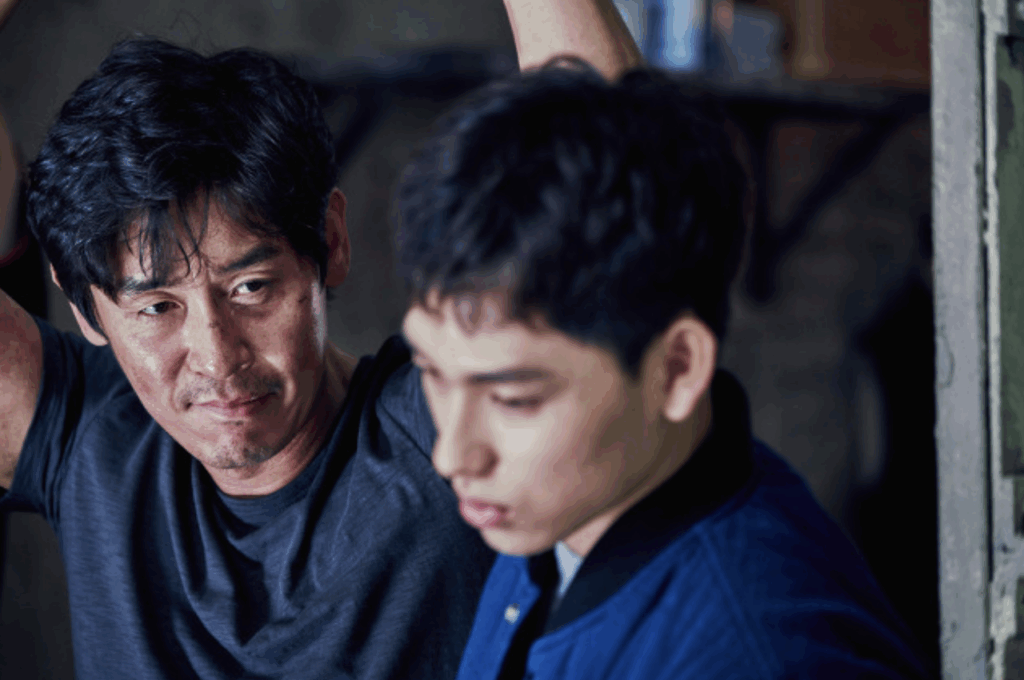
I think Jae-ho sees his younger self in Hyun-soo. Before he became the hardened gangster we see now, before the iron mask settled permanently over his face. There’s even a line where Jae-ho tells Hyun-soo:
“I was exactly your age when I started here, in this old warehouse.”
That’s when he began doing truly terrible things, when he became a proper villain.
Plus, both have this playful, cheeky, easygoing charm. People are naturally drawn to those who remind them of themselves, aren’t they? We all fall in love with our own reflection, one way or another.
Biblical Stagecraft
Eight years have passed since this film’s release, so I’ll dispense with spoiler warnings.
After watching it on Netflix, I fell down a Google rabbit hole and discovered this film has a devoted cult following. Their detailed analyses made me slap my knee in recognition—yes, yes, that’s it exactly.
In the prison dining hall, Jae-ho is playing Jesus. It’s framed like The Last Supper, with inmates around him like disciples. When he explains the power dynamics in prison, he says:
“I’m the one who sets the standards.”
He’s literally called “Jesus” in prison. The metaphor isn’t subtle, and it doesn’t need to be.
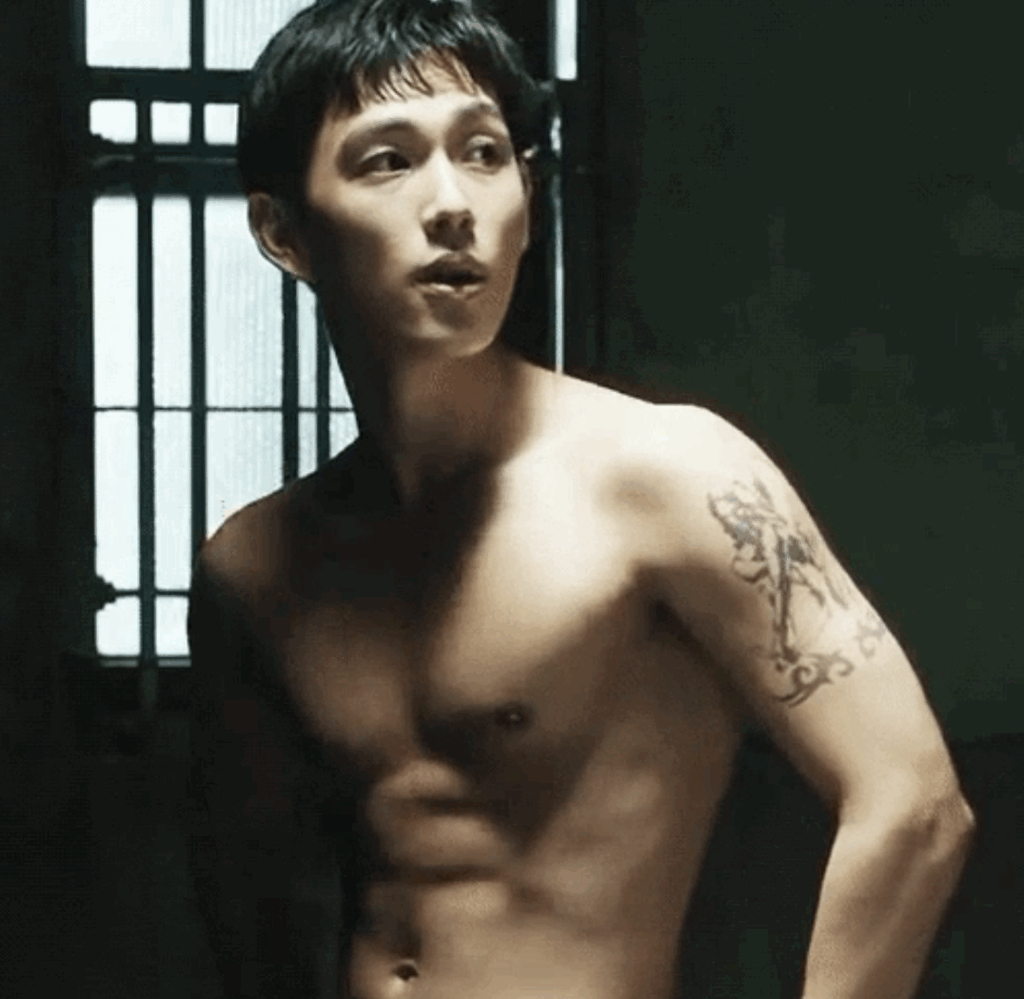
Here’s what surprised me most: Hyun-soo has two tattoos. An angel on his arm. A scorpion on his shoulder. The scorpion, I learned, symbolizes Judas—the betrayer.
And here’s the devastating detail: after Hyun-soo gets shot in the arm, his angel tattoo is covered with bandages. Only the scorpion—Judas—remains visible.
So Hyun-soo embodies both: the angel and the betrayer. And as the angel is hidden and the scorpion is revealed, he ultimately betrays Jae-ho, just as Judas betrayed Jesus.
Remember what Jesus said to Judas before the kiss?
“Do quickly what you are going to do.”
And in The Merciless, what does Jae-ho say to Hyun-soo as Hyun-soo chokes the life out of him? “Don’t make the same mistake I did.” It’s the same structure. The same resignation. The same terrible love.
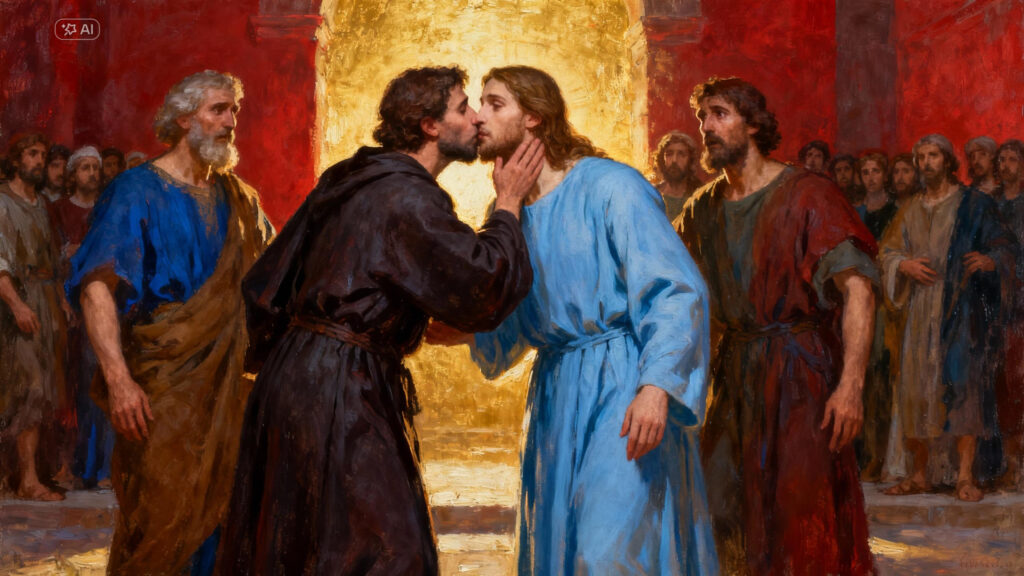
Another detail I didn’t notice until I read fan analyses: Hyun-soo never eats.
Not once in the entire film. Why? Because eating is human. Earthly. Mundane. And Hyun-soo? He’s not meant to be human. He’s an angel.
But angels in the Bible aren’t always gentle and kind. They’re instruments of divine will, sometimes terrifying in their purpose. Hyun-soo is that kind of angel—beautiful, yes, but capable of ruthless judgment.
A Symphony in Red and Blue
The film is particularly beautiful when red appears on screen.
Red symbolises Jae-ho’s desire—not just sexual, though that’s certainly present, but desire in all its forms: for power, for connection, for love. The screen turns particularly red during two sequences: the Regard Club and when he kills Chairman Go.
The Regard Club sequence flows like this: Elevator Scene One, then the Club Scene, then Elevator Scene Two.
In the first elevator scene, a strange tension builds between them. In the club scene, sexual tension escalates while they discuss plans for seizing power.
Finally, the second elevator scene delivers that unmistakable sexuality. This is when both desire for Hyun-soo and desire for power begin to crystallise into something concrete.
When he kills Chairman Go, the screen is particularly red, and Jae-ho even smokes a cigarette. Throughout The Merciless, when a character smokes, they hold power in that relationship.
Red screen plus cigarette equals Jae-ho, who has obtained both power and Hyun-soo. His expression at this moment explodes with sexiness—the look of someone who has everything they want.
There are other red moments too. The red Mustang with Jae-ho lying in it, waiting for Hyun-soo.

Usually, a boss doesn’t personally drive out to pick up a released subordinate. He came to meet someone he missed. And later, Jae-ho in a red robe, is preparing to meet Hyun-soo at the hideout. There’s something domestic, almost husband-like, about that scene.
Then there’s blue.
Blue feels like a counterpoint to red—calmer, sadder, more resigned. When things start falling apart, the colour palette shifts. The final scenes are drenched in blue: betrayal, loss, the cold realisation that love isn’t enough. Blue is the colour of endings.
The Body Search Scene
The body search scene in the club. Jae-ho searches Hyun-soo for a wire. Their faces close. Hands moving. The camera lingers. The moment stretches.
This isn’t just a practical search. This is intimacy disguised as suspicion.
Jae-ho needs to know if Hyun-soo is betraying him, but there’s also this desperate desire to touch, to be close, to confirm that Hyun-soo is real and present and his.
The way Sul Kyung-gu plays this scene—equal parts threatening and tender—is masterful. You can see Jae-ho wants to believe. He wants the search to come up empty. He wants proof that his love isn’t misplaced.
And when it does come up empty? The relief in his eyes is heartbreaking. Because we, the audience, know the truth. Hyun-soo IS a cop. The wire just isn’t there that night. The betrayal is real. Jae-ho’s love is doomed.
When Control Slips
Remember how Jae-ho always controls the ball? Well, there’s a scene where he plays marbles with Hyun-soo. And Jae-ho loses. Wait. What? This is the man who reads five moves ahead. How does he lose a simple marble game?
Two possibilities. One: he genuinely loses control when it comes to Hyun-soo. Two: he lets Hyun-soo win. On purpose. Either way, it’s symbolic. For the first time, Jae-ho isn’t in control.
And that brings us to the ending. Jae-ho goes to meet Hyun-soo one last time. He knows. He absolutely knows it’s a trap. But he goes anyway.
Why? Because he wants to believe. Even if just for a moment, he wants to hope the ball will bounce the way he wishes it would, along the path he hopes it will take. That’s love. Choosing belief over calculation. Choosing hope over certainty.
You’re Completely Possessed
The most striking moment for me: when Jae-ho is about to kill Byung-gab, Byung-gab screams:
“You’re completely possessed!” (sseu-i-da)
The English subtitle says: “You’ve been fooled.” I thought that was a brilliant translation.
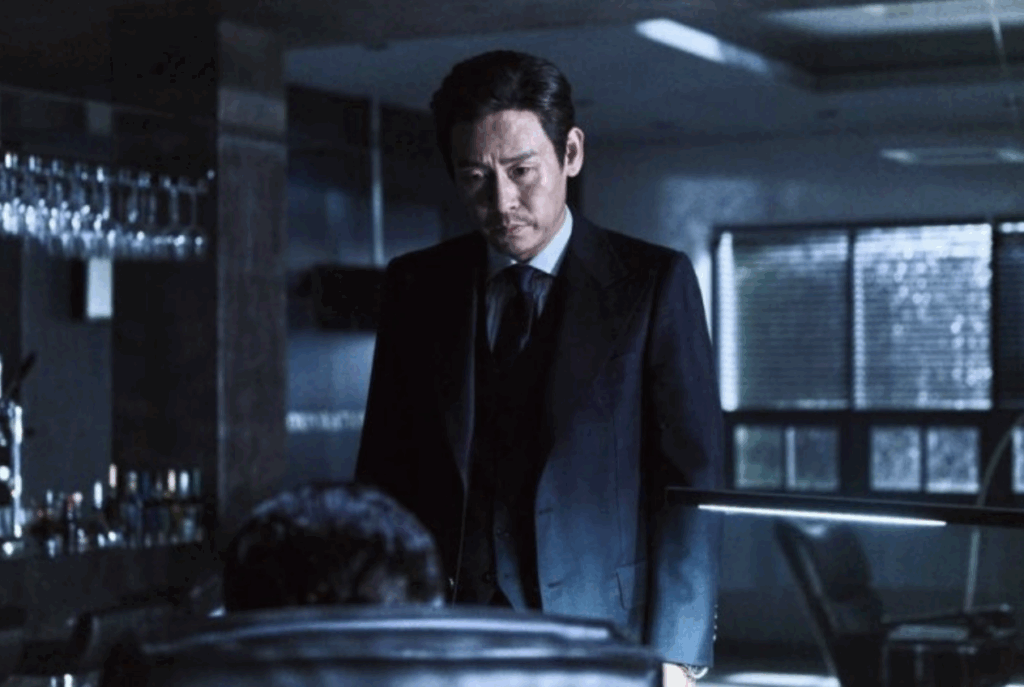
In Korean, to be sseu-i-da means “to be possessed by a ghost” or supernatural force. We say, “Are you possessed?” when someone acts crazy, or “You’ve completely changed” when someone seems like a different person.
Instead of begging for his life, Byung-gab mourns Jae-ho’s fate—possessed by someone like a ghost, by Hyun-soo. Korean often omits the subject.
Here, Byung-gab doesn’t explicitly name Hyun-soo. But the one who has completely “possessed” Jae-ho? It’s Hyun-soo. This was the most explicit moment capturing Jae-ho’s romantic feelings for Hyun-soo.
Mother’s Memorial Day
Today I suddenly realised: the day Hyun-soo is kidnapped is his mother’s memorial day. Why the hell did I only notice this now?
When Hyun-soo returns, they show a flashback to one year ago—the day of Hyun-soo’s mother’s death.
Before we hear Hyun-soo’s footsteps in the second hideout scene, Jae-ho punches the sofa, anxious and restless. I used to wonder why he was acting like that.
Now I see it’s similar to the last hideout scene where he hits the sofa. Jae-ho knows the truth will eventually be revealed, anxious about when Hyun-soo will learn the truth—anxiety, fear, sadness. Because it’s Memorial Day, what he did would come to mind.
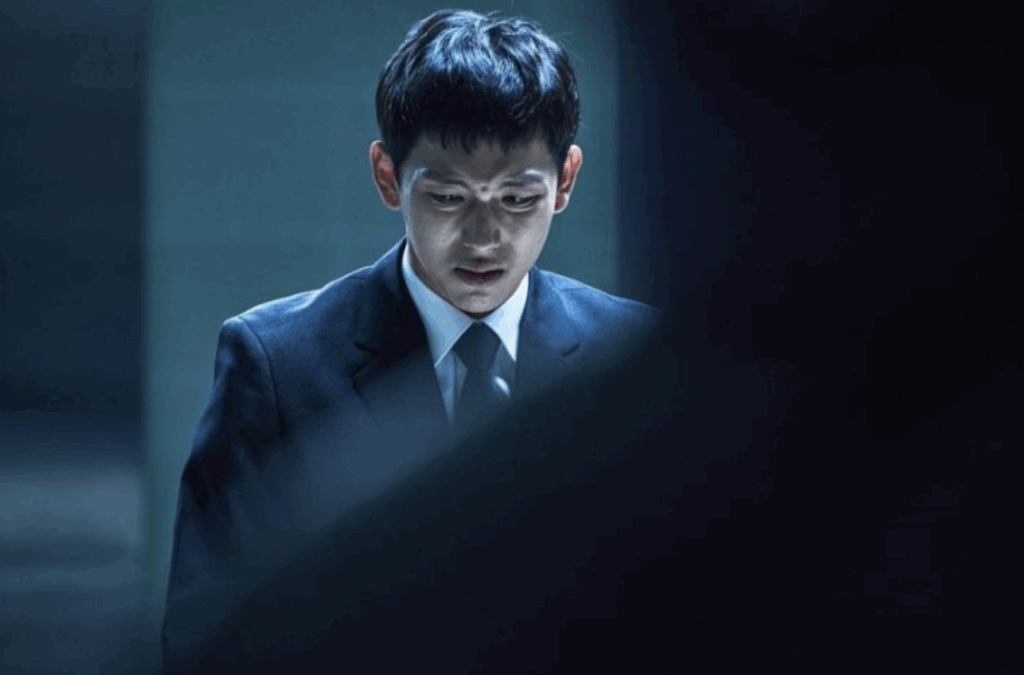
And why does Hyun-soo head to the hideout without even changing clothes, looking dishevelled? I think they already had an appointment. He was late because of the kidnapping.
No time to change, so he rushed to the hideout.
On a Memorial Day, and he doesn’t show up at the appointed time?
So Jae-ho worries—what if something happened to Hyun-soo—expressing his psychological state by hitting the sofa.
When Team Leader Cheon threatens to delete Hyun-soo’s records while touching photos, his right hand is bandaged. Go back to the CCTV scene from Hyun-soo’s mother’s death—he slams the desk with his right hand and breaks the laptop.
Could that really have injured his hand? Probably not, but there’s no other explanation. Drawing attention to the bandaged hand while touching photos seems to show the passage of time.
In other words, when he calls, he already knows from the CCTV that Jae-ho did it. Team Leader Cheon didn’t know Jae-ho already knew Hyun-soo was a cop trying to ensnare him.
He thought Jae-ho suspected Hyun-soo and killed the mother, then would see who handled the aftermath to determine if Hyun-soo was really a cop.
Looking back now, Team Leader Cheon tried his best to protect Hyun-soo from being exposed.
The Final Scene
When Jae-ho killed his mother, rather than thinking “I’ll never forgive Han Jae-ho,” I think Hyun-soo thought:
“Okay, if you killed even my mother to keep me by your side, how far can you go for me?”
He called Jae-ho to confirm this. Using the police who had used him, using Jae-ho for revenge against the police. Of course, risking his own life too.
The old Hyun-soo would have rushed in consumed by revenge.
But there’s a reason someone called him a “punk” in the film.
Hyun-soo isn’t the same person he was when his mother died. The Choi Sun-jang scene showed his cruelty. Before, he injured his right hand saving Jae-ho. Now, he injured his right hand putting someone in a vegetative state. Hyun-soo had changed.
The first thing that came to changed Hyun-soo’s mind:
“Jae-ho’s words—I don’t trust people, I trust situations.”
Would such a Jae-ho believe his words and come? His phone voice was unusually low. In that urgent situation, why suggest meeting at the hideout? Why ask if anyone knows his identity? Thinking back, there were reasons to be suspicious.
And if he really intended to help police capture Jae-ho, an unfamiliar location would’ve been better. But he chose a location where he’d be immediately exposed.
The scene of Hyun-soo bouncing a ball in the prison, then seeing from above Jae-ho getting out of the red sports car, reminded me of Jae-ho lying on a red bench, looking up at him, asking “Photosynthesising?” when he told Byung-gab he’d “try to ensnare him, or if that fails, soak him.”
Each testing the other.
Byun Sung-hyun’s Obsession with Hierarchy
Wait, let me briefly talk about Kill Boksoon.
My favourite relationship in that film is between Boksoon and Hee-sung. When Hee-sung was C-tier, he acted indifferent to hierarchies. But when he learns the truth, he shows up in a full suit, revealing he’d always been obsessed with rank—far more than Boksoon, despite his cool pretence.
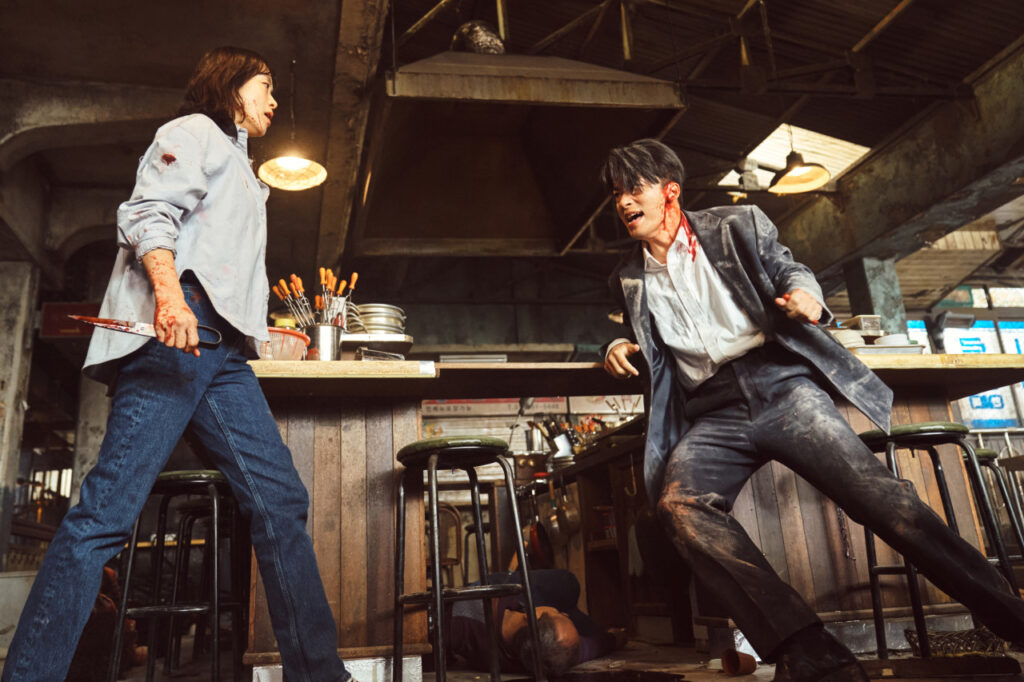
In Good News, Go-myeong is the lowest cog in the bureaucratic machine, “sweet to swallow, bitter to spit out”—tossed around at their convenience. Director Byun loves exploring who sacrifices in power structures.
In The Merciless, Jae-ho willingly “loses” for Hyun-soo, the one who loves more sacrifices more. In Kill Boksoon, Hee-sung rebels against his source of inferiority and gets killed. In Good News, Go-myeong is just one replaceable gear in a system that can kill him effortlessly.
I’m eager to see what structure he uses to show power’s sacrificial victims in his next project.
Guilt and Love
In the beginning, Jae-ho makes eye contact during everything—even when deep-frying someone alive, his eyes never waver. He’s in control. He’s made peace with what he is.
But gradually, he starts avoiding Hyun-soo’s gaze, and this shift tells us everything about how power is changing hands between them.
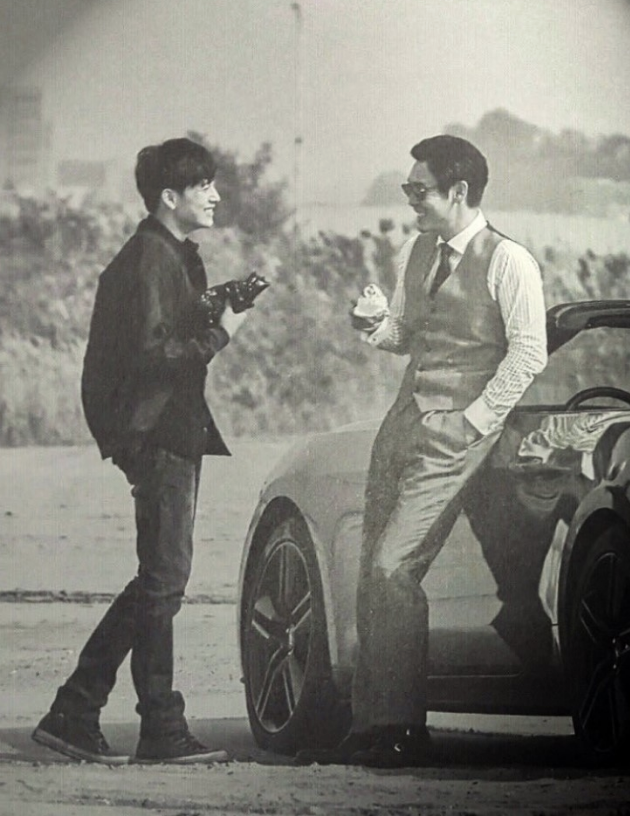
Later, in the elevator body search scene, even when Hyun-soo physically pulls him and tries to make eye contact, Jae-ho stands like a stone, refusing to meet his eyes. It’s one of the most painful moments in the film because you can see how much effort it takes him to look away.
Why does Jae-ho start avoiding Hyun-soo’s gaze? I have two interpretations, and both break my heart.
First interpretation: a man bearing guilt.
Hyun-soo speaks all truth, remains faithful, has conviction in everything he does—so as the film progresses, he never avoids eye contact. His gaze is steady, clear, unashamed.
But Jae-ho? The entire foundation of their relationship, Hyun-soo’s blind, almost religious faith—all of it began with a lie. The guilt grows heavier with every passing day, with every moment Hyun-soo looks at him with those trusting eyes, so he can’t meet Hyun-soo’s gaze anymore. To look would be to confess.
The second interpretation appears in the final scene, and this is where these two elements converge and drive me mad.
As Jae-ho drives to the meeting place Hyun-soo mentioned, the screen shifts from red to blue—this is where fire willingly jumps into water. Until now, it was water jumping into fire, Hyun-soo jumping into Jae-ho’s world. But in the final scene, fire jumps into water.
And the final scene perfectly demonstrates both interpretations of why Jae-ho avoids eyes.
All truth is revealed, guilt is exposed—”Sorry, is it because you can’t shoot me?”—and simultaneously, making eye contact with Hyun-soo at the moment of death, both ends complete their relationship.
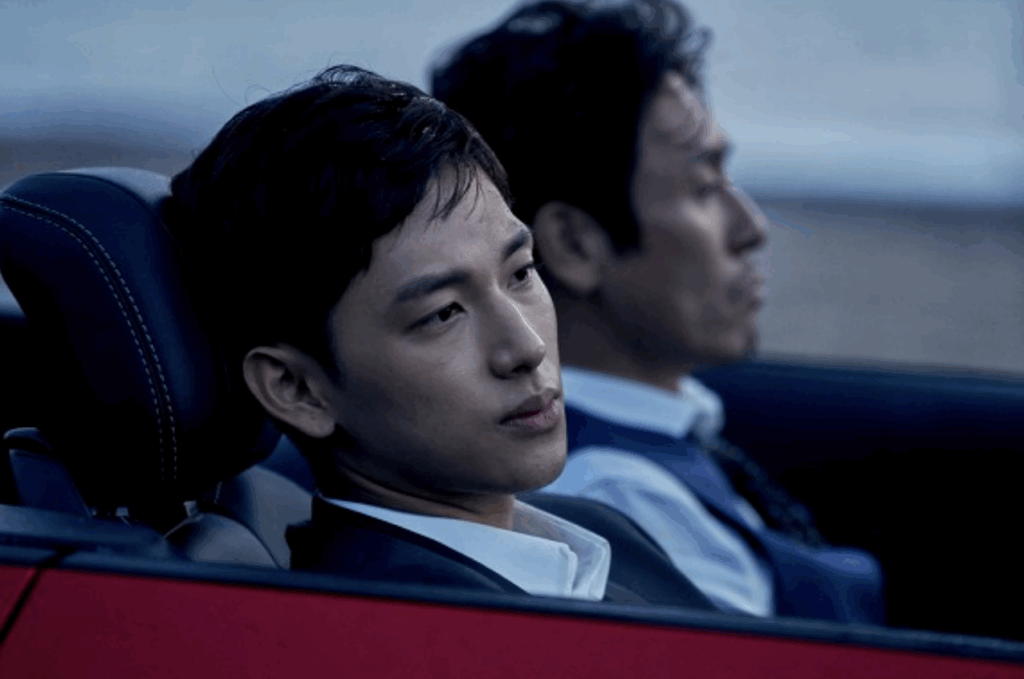
Settling the guilt and paying for that sin, showing even his heart—all by dying at Hyun-soo’s hands. And the method Hyun-soo chooses to kill Jae-ho? Not a gun, not strangling, but covering his nose and mouth.
Not choking the neck but covering nose and mouth—a man dying like a fish with its gills blocked, the tide rolling in, the sky turning blue. Fire jumped in and was finally completely consumed by water, by Hyun-soo, becoming a fish.
Power Visualized
Director Byun is meticulous about visual symbolism, and nowhere is this clearer than in the details of shoes and sleeping arrangements.
When Jae-ho has connections with prison officials, he wears pristine sneakers. When he briefly loses power? He’s barefoot. When he regains control? The sneakers are back. It’s such a small detail, but once you notice it, you can’t unsee it.
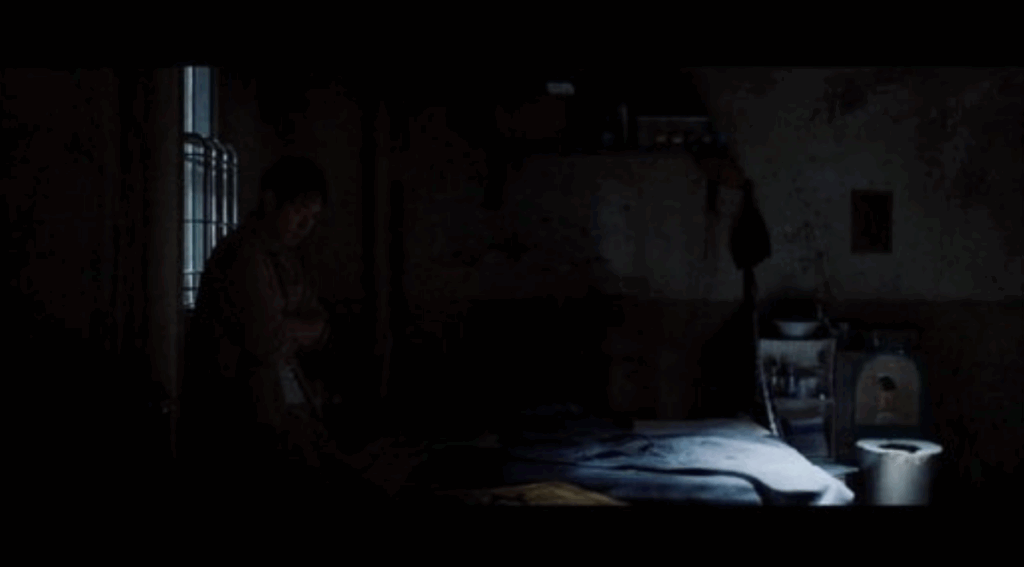
In a cramped cell where multiple people must sleep, where you sleep symbolically shows the hierarchy within that space. It’s prison sociology rendered visible.
When Jae-ho and Hyun-soo share a cell, Jae-ho gives Hyun-soo the best spot. And where does Jae-ho sleep? Near the toilet. The worst spot in any cell, the spot reserved for the weakest, the newest, the most powerless.
This is romantic staging born from power dynamics.
To Hyun-soo, Jae-ho presents himself in a weaker position, and this too can be seen as a romantic direction born from power dynamics. He’s making himself vulnerable, making himself small, all for this one person.
Love, after all, reflects power dynamics, doesn’t it?
The person who loves more has less power. The person who loves less holds the power. It’s a cruel calculus, but true. Seeing him give up the bed and sleep near the toilet, in the lowest position, Jae-ho already loved Hyun-soo. From the very beginning, the power dynamic was clear.
This dynamic continues to the ending.
Jae-ho cannot kill Hyun-soo. But Hyun-soo, positioned as “the one who loves less,” stands over fallen Jae-ho with the power to decide his fate. I found this incredibly compelling, this visualisation of how love strips away all other forms of power.
Asymmetrical Direction
I’ve read interviews about the filmmaking. Director Byun has said in multiple interviews that the emotions between Jae-ho and Hyun-soo are melodrama, not action, not noir, but melodrama dressed in genre clothing.
The most sexually charged sequence in this film? The body search scene. Even someone completely oblivious to queer subtext would feel that tension crackling in the air.
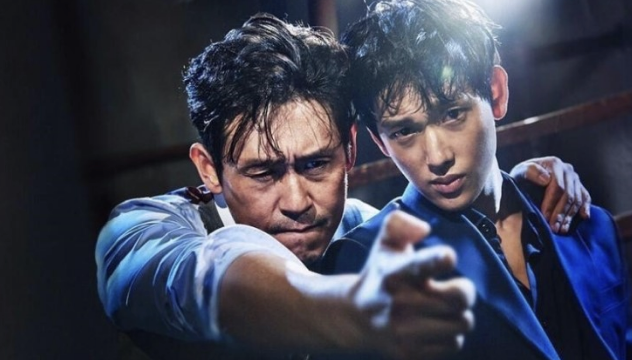
But here’s what’s fascinating: Director Byun instructed Sul Kyung-gu to bring “queer sexuality” to the scene. But he didn’t tell Im Si-wan. Im Si-wan later said he had no idea it was meant to be romantic. He played it as loyalty, as duty, as professional respect.
Even before I read that interview, I already felt Jae-ho’s feelings for Hyun-soo were close to love.
In this dog-eat-dog world of hierarchies, where those of lower rank must lick the shoes of those above, Jae-ho could willingly sacrifice himself because he loved Hyun-soo more.
To convey that metaphor, the director intentionally created an asymmetry: he asked only Sul Kyung-gu to bring queer sexuality to the performance. That directorial choice makes complete sense to me.
It creates unrequited love, which is always more painful, always more beautiful, always more devastating than mutual love. One person pouring everything out while the other remains unaware, giving loyalty and respect but not the romantic love being offered—it’s heartbreaking.
The Gun as Metaphor
A queer reading I encountered that made me rethink everything: guns traditionally symbolise sexuality, right? Ejaculation equals shooting a gun. It’s one of the oldest metaphors in cinema. When Jae-ho shoots Hyun-soo, some read it as a sex scene. Watching it again with that interpretation, I can see exactly why.
Jae-ho licks his lips. “One more time?” That line, loaded with double meaning. Meaningful groans that sound nothing like pain. Blood. And immediately after, Team Leader Cheon goes “Ha!” as he realises in the car what’s between these two, what he’s just witnessed.
The dialogue and flow feel so loaded. Why else would the shooting scene be so long and strangely intimate, if not for sexual tension? Why linger on the moment, on the faces, on the breath between them?
The Fireworks Scene
The fireworks scene felt so random at first. Why fireworks? Why this moment?
Fireworks have this characteristic—you light them and they explode brilliantly, illuminating the entire sky, and then they fade away into smoke and darkness. They’re beautiful precisely because they’re temporary.
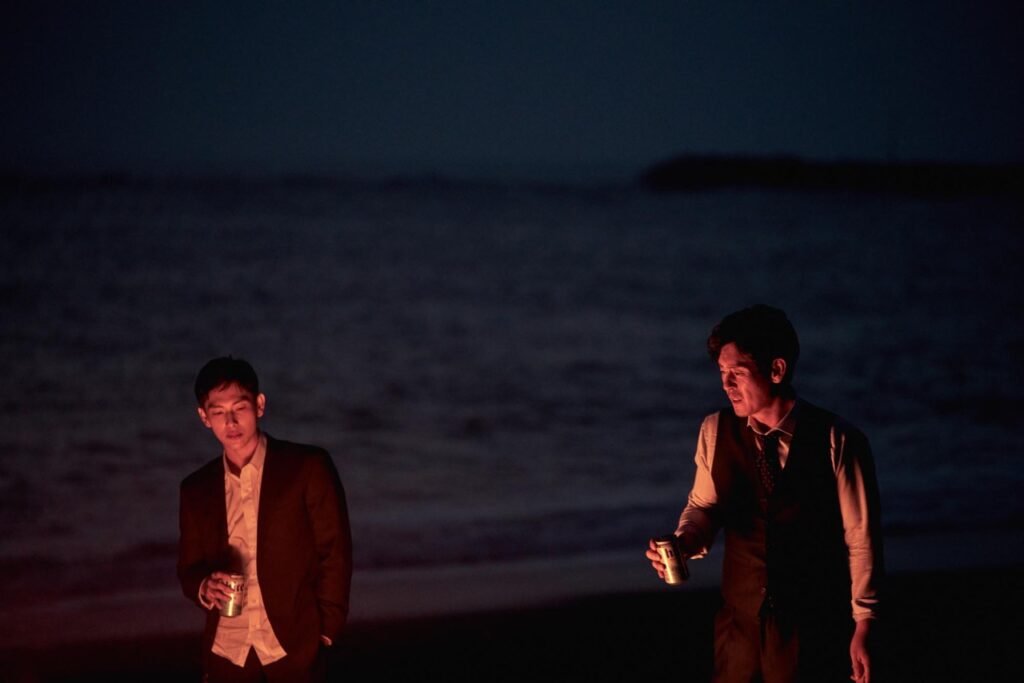
Before this scene, they’re cleaning out Choi’s place together, joking about D-Day, spending time cheerfully and vividly. This is the fireworks being lit, exploding brilliantly.
Jae-ho chases Hyun-soo around playfully, both laughing, playing together like children, like people who haven’t killed, like people who are just happy to be near each other—showing their joyful, easy relationship at its peak.
After this, on D-Day, Hyun-soo sides with Jae-ho and betrays the police. Team Leader Cheon loses it and plays his trump card—showing the video that changes everything between them. This is when the fireworks begin to fade, when the beautiful light starts dying, when reality comes crashing back.
And this connects to the scene of them at dawn on the beach, cleaning up, and the conversation in the car afterwards. Jae-ho stumbling, Hyun-soo holding the same stick to help but not quite supporting him—present but distant.
The exchange: “Don’t you get tired of living like this?” and “I live like this to survive.” The intimacy is dying. The fireworks are fading to ash.
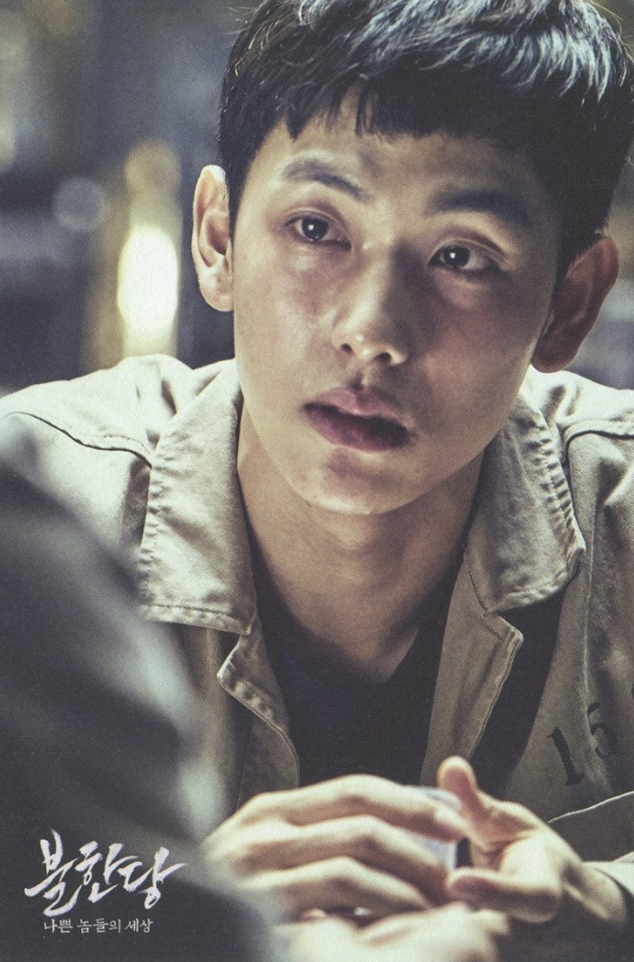
The Birth of the Cult
The Merciless failed at the box office in 2017. But something interesting happened: the film found its audience on streaming platforms. A cult fandom formed. They called themselves Bulhandang-won—”The Merciless Crew.”
What to Watch For
The Merciless is streaming on Netflix now.
This time, watch for the ball bounces. Watch for Jae-ho’s control and where it slips. Watch for the body search scene and the asymmetry of desire. Watch for the marble game and what it means to lose.
Watch for the symphony of red and blue, fire and water, desire and dissolution. Watch for the evolution of eye contact, how looking becomes impossible, how avoiding the gaze becomes its own form of communication. Watch for how a man who controls everything loses control of the one thing he loves most.
Watch fire become water, become a fish, and die. Watch how, in the end, the possessed cannot escape the one who possessed them. Even in death. Especially in death.
Because that’s what love is, isn’t it? Not control, but the willing surrender of it. Not calculation, but the leap into blue water even when you’re made of fire. Not knowing, but believing.
Not safety, but the deliberate choice to walk into the trap because hope, however foolish, however doomed, is more beautiful than certainty.
Even when—especially when—you know it will kill you.
Want to see where Scheherazade’s tale begins? → Click here to jump to Part 1
🚫 Copyright Disclaimer: All drama footage, images, and references belong to their respective copyright holders including streaming platforms and original creators. Materials are used minimally for educational criticism and analysis with no intention of copyright infringement.
⛔️ Privacy Policy: This site follows standard web policies and does not directly collect personal information beyond basic analytics for content improvement. We use cookies to enhance user experience and may display advertisements.
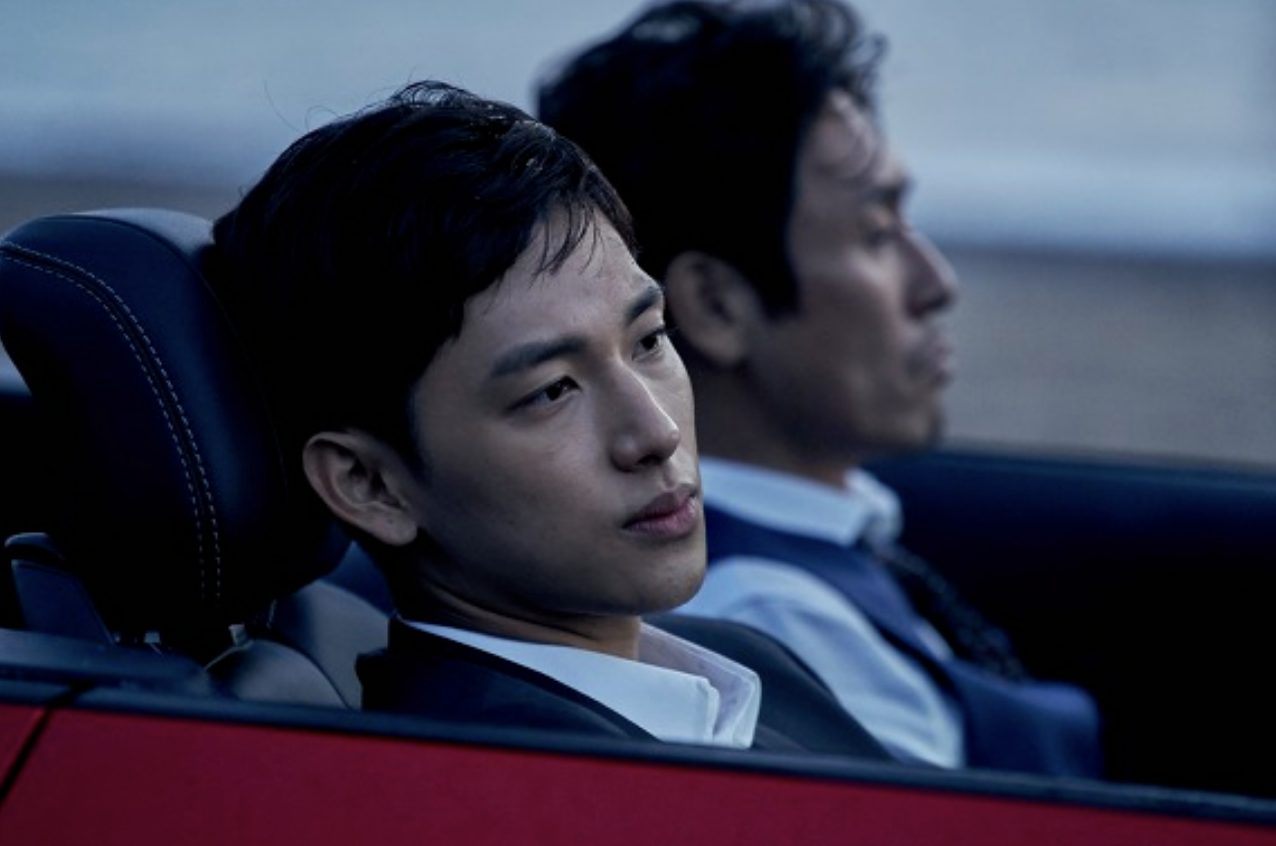
답글 남기기